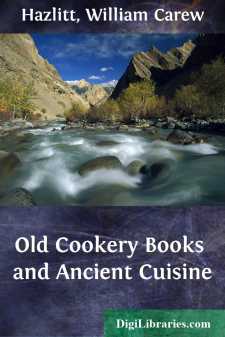Categories
- Antiques & Collectibles 13
- Architecture 36
- Art 48
- Bibles 22
- Biography & Autobiography 813
- Body, Mind & Spirit 142
- Business & Economics 28
- Children's Books 17
- Children's Fiction 14
- Computers 4
- Cooking 94
- Crafts & Hobbies 4
- Drama 346
- Education 46
- Family & Relationships 57
- Fiction 11829
- Games 19
- Gardening 17
- Health & Fitness 34
- History 1377
- House & Home 1
- Humor 147
- Juvenile Fiction 1873
- Juvenile Nonfiction 202
- Language Arts & Disciplines 88
- Law 16
- Literary Collections 686
- Literary Criticism 179
- Mathematics 13
- Medical 41
- Music 40
- Nature 179
- Non-Classifiable 1768
- Performing Arts 7
- Periodicals 1453
- Philosophy 64
- Photography 2
- Poetry 896
- Political Science 203
- Psychology 42
- Reference 154
- Religion 513
- Science 126
- Self-Help 84
- Social Science 81
- Sports & Recreation 34
- Study Aids 3
- Technology & Engineering 59
- Transportation 23
- Travel 463
- True Crime 29
William Carew Hazlitt
William Carew Hazlitt (1834–1913) was a British bibliographer, editor, and writer, best known for his extensive work on early English literature. He edited and published numerous collections of writings, including "The Poems of Robert Herrick" and "Shakespeare Jest-Books". Hazlitt was the grandson of the famed essayist William Hazlitt, and he dedicated much of his career to preserving his grandfather's legacy. He also authored several important reference works, such as "Handbook to the Popular, Poetical, and Dramatic Literature of Great Britain".
Author's Books:
Sort by:
THE EARLY ENGLISHMAN AND HIS FOOD. William of Malmesbury particularly dwells on the broad line of distinction still existing between the southern English and the folk of the more northerly districts in his day, twelve hundred years after the visit of Caesar. He says that they were then (about A.D. 1150) as different as if they had been different races; and so in fact they were—different in their...
more...
INTRODUCTION. When a small impression of these quaint old books issued from the Chiswick Press, many years ago, under the auspices of the late Mr. S. W. Singer, that gentleman merely designed the copies struck off for presentation to a select circle of literary friends who, like himself, felt a warm interest in every relic of the past which helped to illustrate Shakespeare and ancient English manners....
more...



